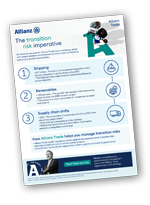- Sustainability is a strategic advantage. Embedding ESG and sustainability into global trade strategies strengthens financial resilience, enhances brand reputation, and unlocks new opportunities for long-term success.
- Transition and physical risks are reshaping industries. The flow of global trade is increasingly influenced by factors including advancing technologies, nearshoring, evolving business models, and climate-related physical risks. Companies must navigate these factors to maintain financial stability.
- Allianz Trade empowers businesses. With deep insights into global trade dynamics and risk mitigation solutions, we help businesses manage ESG-related risks, support transition solutions, and seize opportunities in an evolving market.
Summary
Key Takeaways
A sustainable future for global trade
Environmental, social, and governance (ESG) factors are no longer optional considerations; they’re central to business success in global trade. As industries move towards sustainability, companies must navigate transition risks, such as regulatory shifts, technological changes, and new business models, as well as physical risks, including climate-related disruptions that impact trade routes, ports, and logistics.
A striking example of a climate event disrupting global trade was seen in 2023, when severe droughts began affecting the Panama Canal. The canal is usually responsible for up to 5% of global trade flows, but the droughts meant the number of daily vessels able to pass through had to be reduced by 50%, causing severe disruptions. The growing impact of climate disruption underscores the need for businesses to assess their risk exposure and build resilience against transition and physical risks.
At Allianz Trade, we’re committed to supporting the transition to a net-zero economy by 2050, aligning with the Paris Agreement. We recognise that businesses need to adapt to both the risks and opportunities of this transition, ensuring long-term resilience and growth.
The transition risk imperative: Evolving industries and markets
Transition risks arise when industries shift to meet sustainability goals. Regulatory changes, new technologies, and evolving business models are transforming the way companies operate. Adapting to these shifts isn’t just about compliance – it’s also about staying ahead of the curve and turning challenges into opportunities. For example:
- The shipping industry alone requires a minimum investment of £17 billion annually to reach net-zero emissions by 20501. This underscores the broader need for substantial financing across sectors to meet sustainability goals and creates an opportunity for growth.
- Renewable energy use must increase by 15% per year on average to meet the net-zero 20502 target, which represents a massive opportunity for businesses.
- Nearshoring and supply chain relocation are becoming critical strategies. Our recent survey3 showed that 22% of companies are prioritising ESG considerations when relocating their supply chains. This will allow local market players to regain traction if they show their commitment to ESG.
The transformation of industries brings uncertainty, but it also creates the potential for growth. Companies that anticipate these shifts can position themselves ahead of the competition. We recognise that navigating these shifts requires the right insights and financial strategies. Through solutions like our Green2Green Surety Bonds and Specialty Credit solutions, we help businesses secure the financing they need for sustainable investments.
Physical risks arise from the increasing impact of climate change on trade and business operations. Extreme weather events, rising sea levels, and shifting climate patterns threaten supply chains, infrastructure, and financial stability. These disruptions not only delay shipments but also affect cash flow, operational resilience, and long-term business sustainability.
Maritime and port disruptions provide key examples: ports are key nodes in global trade, and climate-related disruptions like storms and droughts can delay shipments, which in turn disrupt payments and increase financial volatility. With a large portion of globally traded goods transported by sea, disruptions in this sector have far-reaching consequences.
Through our trade credit insurance and data-driven risk assessments, we help businesses safeguard their financial stability. Our risk assessment process considers not only company-specific financial risks but also country and sector risks. Our country risk analysis includes ESG factors, and our underwriters are continuously trained to assess the impact of physical and transition risks on various sectors.
ESG as a competitive advantage
ESG and sustainability are no longer just regulatory concerns; they’re drivers of financial strength and long-term success in global trade. Businesses that integrate ESG principles can:
- Enhance financial stability by reducing exposure to transition and physical risks
- Access better financing, as investors and banks favour companies with stronger ESG credentials
- Strengthen market positioning by aligning with sustainable trade trends and consumer preferences
- Reduce costs and disruptions by proactively managing climate risks and supply chain stability
We offer tailored solutions to help businesses manage ESG-related risks and transition to net-zero successfully.
At Allianz Trade, we support businesses navigating this evolving landscape. Our innovative solutions empower companies to manage risks, seize new opportunities, and lead in sustainable trade.
Discover more about our sustainability vision or reach out to a member of our A-Team to discuss how we can work together for a greener future.
You might also be interested in…
Four ways BNPL can unlock your business’s e-commerce revenue potential
BNPL: The new critical success factor for B2B e-merchants
Five key benefits of trade credit insurance
Let's talk...
For a free credit insurance consultation call our UK team, 09:00-17:00 Mon-Fri.

Our expertise and commitment
Allianz Trade is the global leader in trade credit insurance and credit management, offering tailored solutions to mitigate the risks associated with bad debt, thereby ensuring the financial stability of businesses. Our products and services help companies with risk management, cash flow management, accounts receivables protection, Surety bonds, Business Fraud Insurance, debt collection processes and e-commerce credit insurance ensuring the financial resilience for our client’s businesses. Our expertise in risk mitigation and finance positions us as trusted advisors, enabling businesses aspiring for global success to expand into international markets with confidence.
Our business is built on supporting relationships between people and organisations, relationships that extend across frontiers of all kinds - geographical, financial, industrial, and more. We’re constantly aware that our work has an impact on the communities we serve and that we have a duty to help and support others. At Allianz Trade, we’re strongly committed to fairness for all without discrimination, among our own people and in our many relationships with those outside our business.







